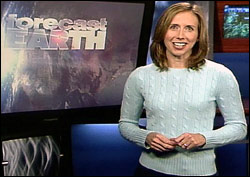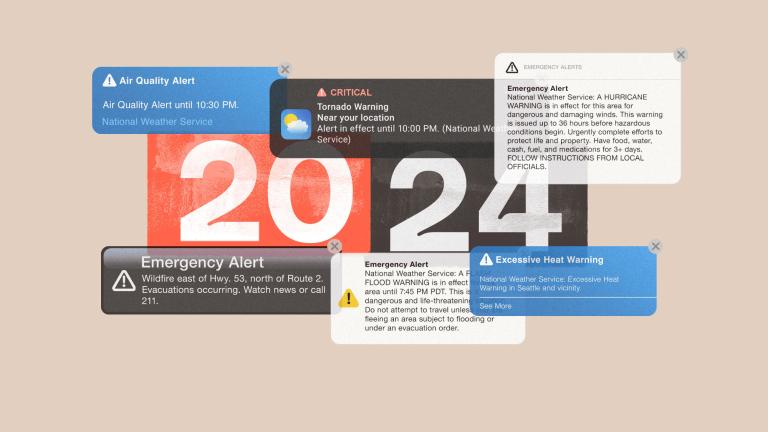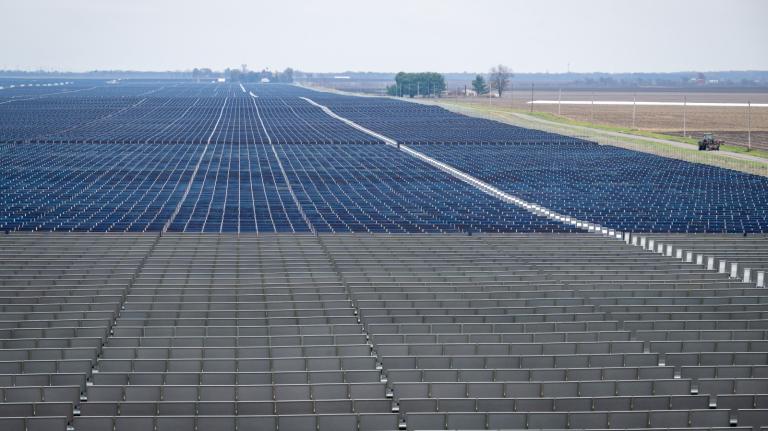As Hurricane Katrina raged toward the Gulf Coast in late August, more than 4.5 million American homes tuned in to The Weather Channel — many times the network’s average audience. The channel’s bright-eyed climate-change expert, Heidi Cullen, was standing by to address the question that was confounding Americans nationwide: Was Katrina’s horrible wrath intensified by global warming? Was this a precursor to an era of super-hurricanes?

Heidi Cullen, a pioneer on the climate beat.
Photo: The Weather Channel
Cullen, a climatologist, was hired two years ago by The Weather Channel, plucked from her post-graduate work at the National Center for Atmospheric Research in Boulder, Colo. Despite having no prior experience in journalism, she has proven an agile translator of complex science into everyday parlance. Her position represents a first for the mainstream American media: a weather reporter exclusively covering the climate-change beat. It’s an unusual role at a time when some in the White House and the Republican-led Congress are still aggressively questioning the science of global warming.
Cullen spoke with Grist last week from The Weather Channel headquarters in Atlanta about the science behind America’s worst “natural” disaster and the challenge of translating climate change into sound bites for the American masses.
We’ve heard a number of newscasters attribute Hurricane Katrina’s intensity to warmer oceans resulting from climate change. Did you immediately think you were facing the biggest story of your career?
To be honest, the first couple days afterward, part of me was thinking, Who cares about the global-warming component of this story? Who cares if global warming made a contribution to this awful, awful disaster? Shouldn’t we be highlighting the near-term challenge of rebuilding the communities and restoring their environmental health?
Global warming or not, there are so many human-made components to this story, especially population growth and coastal development combined with the incredible loss of wetlands, which act as a natural barrier and soak up the impact of hurricanes. We’re losing a football field of wetlands every 40 minutes in America. They’ve virtually disappeared along the Gulf Coast, and that had a lot to do with the tremendous damage Katrina caused.
So are you saying you don’t buy the theory that warmer seas cause more intense hurricanes?
No, there’s plenty of compelling evidence — including a paper recently published in Nature by MIT professor Kerry Emanuel — that an increase in sea surface temperature accelerates the wind speed and precipitation levels of hurricanes. It could be that this added some fuel to the fire to help make Katrina so big and intense. But there are so many other variables to consider. You have to ask, for instance, whether global warming will increase wind shear, which could in turn choke off storm formation. Before concluding that global warming is going to give way to an era of super-hurricanes, you have to ask, how is it going to affect all the ingredients that go into hurricane formation, not just sea temperatures.
I saw reports in German newspapers saying, “Take that, America! You should have signed Kyoto, now you’re paying for it.”
That’s just an egregious misuse of science. I don’t want the scientific method to be lost in all of this finger-pointing and apocalyptic talk.
Given how generally apathetic the American public is to the climate issue, isn’t it helpful for the media to connect the dots and say, here’s an opportunity to think about the bigger context and evidence that this could be a sign of things to come?
Sure, and we made that point at The Weather Channel. We also pointed out that the scientific community has been predicting a Katrina-like scenario in the Gulf Coast region for decades, literally, regardless of global warming. There was tremendous sadness but very little surprise among my colleagues when it hit. The shock is really that officials and the public didn’t heed scientists’ repeated warnings and bolster the infrastructure of New Orleans many years ago. As I see it, Katrina is a warning that scientific predictions need to be better integrated into the public discourse and play a bigger role in America’s long-term thinking and planning.
How does it feel to be the first weather reporter in the country exclusively covering the climate beat?
Well, it’s a total thrill for the most part, but also a bit humbling. I’m like one of the characters in The Lord of the Rings that only people who are obsessed with the movie would know about — a minor character, in some respects. During severe weather it can get a little lonely because there is an inherent challenge to talking about global warming when you are in the middle of a crisis situation. People are tuning in to hear the forecast and make decisions about their safety, not the bigger climate context.
In general, it’s still somewhat of a luxury to talk about global warming — it often gets bumped to the back page. Keep in mind that in a regular newsroom, the question is always, What do you need to know immediately? Usually that doesn’t include background on the big-picture state of the atmosphere. The fact that TWC put me on air to talk about climate stuff shortly after Katrina’s landfall is a sign of their commitment. But here is one of the ironies of global warming: It’s a truly important issue that we need to figure out, but in a crisis situation, whatever is farthest out in time, we talk about least.
In other words, it’s hard to frame climate change like it’s breaking news, given that it’s a gradual and diffuse phenomenon.
Exactly. There’s nothing that feels more like an act of God than a tornado or a hurricane, but when it comes to global warming, it’s not an act of God. There are 6.4 billion people on the planet and we’re all contributing to this sweeping, hugely complex, and to a certain extent imperceptible, global phenomenon, and I think fundamentally that’s hard for people to swallow.
But do you get the sense that mainstream America is getting more attuned to the global-warming issue?
I think between Katrina and the heat waves that swept the country this summer, there are definitely more people connecting the dots. The question of the summer was, Are these heat waves related to global warming? Individual extreme events can never be blamed directly on global warming, because global warming is a big-picture thing. But it does shift the odds. The best climate models that we have show that heat waves will become more frequent and more intense. We’re a bit surer of the connection between global warming and heat waves than between global warming and, say, Katrina.
Tell us how you began covering the climate beat.
I never, ever thought a job like this would exist, or that I would fill it. I was trained as a scientist, not a journalist, so my past two years at The Weather Channel have been a very interesting crash course in reporting. I studied at Columbia University’s Lamont-Doherty Earth Observatory and got my Ph.D. in climatology. I worked amongst people who very much focused on human-made climate concerns, but my focus was on natural climate variability. So it’s not like I was ever Little Miss Global Warming. But after presenting a paper at a meteorology conference on ocean-atmosphere dynamics, I got a phone call from the guy who is now my boss, Stu Ostro, asking me if I wanted to come and interview for the job, and that was that.
Has it been difficult adapting your pragmatic training as a scientist to the sensationalism of the media?
Definitely. I joke to myself that the first year I took the job, I had a problem using adjectives. I didn’t even like to use the word “very” — I was comfortable only with cautious, academic language. People were like, “Good lord, you’ve gotta sex that up a little bit, you’ve gotta make it interesting to people.” So I paid close attention to other science coverage. A pivotal moment for me was when I heard Andy Revkin from The New York Times say that a good reporter has light and heat in a story: light is shedding understanding and giving people useful information; heat is the dramatic aspect that lets the audience know why they should bother caring about it.
So you’ve gotten over your fear of adjectives?
Well, I recently used the word “searing” in reference to heat, and spoke of the “crushing intensity” of hurricanes, which for me, two years ago, would have seemed so irresponsible. I’ve come to terms with the fact that droughts, hurricanes, heat waves, and so on are awful things, and it’s not misleading to portray them as such. It’s kind of beautiful to be able to use words in a way that I was never really given the opportunity to before.
Does it frustrate you that you can only report on the science of climate change and not the political solutions that are necessary to address it?
I think it’s important for us to acknowledge that scientists do certain jobs, and then policy makers do certain jobs. I don’t want to turn into some wonk who talks about anything and everything and assumes a certain amount of expertness at it — there’s too much of that on TV as it is.
Is The Weather Channel wary about taking on an issue that is so politically charged?
It was definitely a bold move for the channel. There’s a core viewer out there who loves The Weather Channel because it’s not political and it’s not nasty, and then to see someone talking about global warming, they’re like, this is the same stuff all over again that I didn’t want to watch on other channels.
Have you encountered resistance from colleagues in the news and weather worlds?
When I got here, there was some skepticism even within the group here as to whether global warming was real or not. But over the past couple of years, I’ve had so many conversations with forecast meteorologists, and a lot of them say, “You know what? This isn’t the same weather I was forecasting 30 or 40 years ago.” And I think among the meteorology community now, there is a sense that patterns look different, and weird things are happening.
Give us a sense of the range of topics you cover.
I’m sorta all over the map. I focus on global warming a lot, but also other atmospheric phenomena, like El Niño. I also do related historical background — like I did an overview of the levee system in New Orleans and the history of coastal erosion in the gulf. As for global warming, I try to show how it’s playing out locally. I covered coastal erosion in Alaska, where houses are falling off the cliffs due to melting permafrost, and the famine in Niger, describing how it’s related to drought. I’ve covered coral reefs in Florida and oyster reefs in Chesapeake Bay that are getting hit by warmer waters. I talk about energy issues — offshore wind power, for instance. I’ve done a segment on how churches are trying to minimize their energy use and communicate environmentalism from a faith-based perspective. I’ve covered the Senate testimony of climate scientists with respect to the energy bill. So I try to cover all of the bases, and keep it light.
Keep it light?
Yeah, with pop-culture references, for instance. I ran some video of Jessica Simpson and Paris Hilton when Hurricane Dennis was listed as one of the top internet search words for the week of July 11, along with Simpson and Hilton. Sometimes you’ve got to go to great lengths to keep people’s interest. My production boss now tells me to watch ESPN, and that’s how you learn to write good packages, because they’re the best in the business in terms of writing stories and effectively using video. So my homework assignment is watching SportsCenter.

